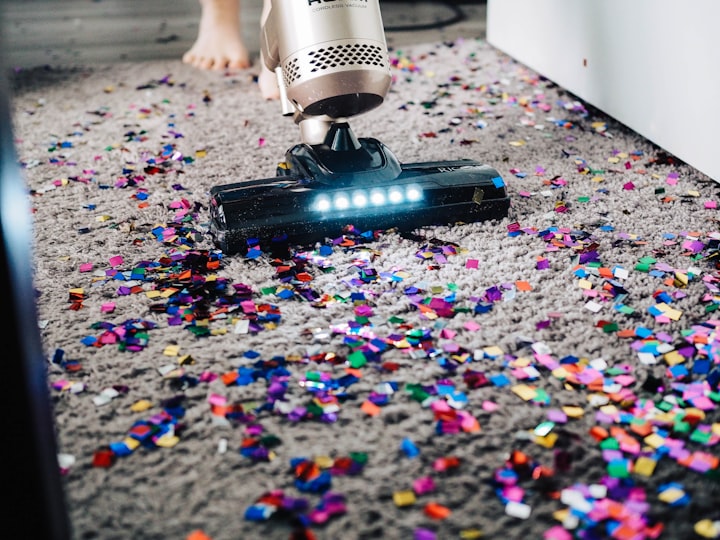How 'Cleanfluencers' Are Helping Our Homecare and Mental Wellbeing
Cleaning may seem like a chore, but it can be used as a way to destress and relax as shown by these Cleanfluencers who are taking social media by storm.

We’re always looking for ways to improve our home style. There’s no shortage of inspiration on the internet, whether through organisational or cleaning tips. In fact, the popularity of cleanfluencers—digital influencers focusing on home cleaning—on Instagram and our television screens continues to grow.
The stars of Netflix and morning show guest spots now rank higher than ever before on our social media feeds. They offer advice on both how to keep a tidy home and how to remain positive, particularly during this adverse period. Here, we look at how cleanfluencers are inspiring us, and why they do it.
The rise of the cleanfluencer
The past year has been a lesson in learning to love where you live. People have become more accustomed to their own four walls than ever before, with multiple national lockdowns throughout the UK.
It’s unsurprising that the popularity of ‘cleanfluencers’ has never been greater. Stuck at home, we’ve become fascinated with Netflix shows including The Home Edit and Tidying Up with Marie Kondo. These programmes have inspired us to maintain our own slice of organised heaven.
One cleaning company, Fulcare, measured the influence of these tidy celebrities through analysing their social media followings and earning potential. Certainly, these programmes have spawned from weighty Instagram fame, with both @thehomeedit and @mariekondo both achieving 4.3 million and 3.8 million followers, respectively.
Amongst these gods of clean is Essex-born Sophie Hinchcliffe, most commonly known as Mrs. Hinch. The sweeping star has claimed 3.8 million followers in only 18 months after writing four successful books this year on home cleanliness. She’s a step ahead of her competitors with an engagement rate of 8.85 per cent. In comparison, The Home Edit has an engagement rate of 1.22 per cent, while Marie Kondo has only 0.78 per cent.
However, while their followings are impressive, their earning potentials are even more so. It's estimated that Mrs Hinch can earn £9,690 per sponsored Instagram post. Meanwhile, The Home Edit tops the charts with an annual income of £567,034. Their messages of tidy living are breaking through.
What’s the message?
To the unassuming, cleaning may appear to be a dull motivation to start a career. But the power of these cleanfluencers has certainly made an impression on home-keepers across the world.
Their message is to lead a positive lifestyle, with cleaning used as a tool to keep your life in order. The Home Edit emphasises that proper organisation will help you in the long-term: “every project is rooted in functional systems that can be maintained for the long-term”. These influencers believe that organisation is not only a system but an aesthetic. It can contribute to how a home should feel.
Marie Kondo believes there is a spiritual link between cleaning and personal wellbeing. Her KonMari method is about choosing joy. She suggests that decluttering your house is equivalent to decluttering your mind. The journey is simple—go through each individual item in your home. If it doesn’t bring you joy, throw it away.
These methods are different to the usual instructions on how best to clean your kitchen surfaces. Instead, they reflect the choices of how we live our lives. Positivity is a more welcome cleaner than furniture polish—although sometimes a good microfibre cloth is essential to get your surfaces shining.
Organising for mental health
Mrs Hinch highlights that she cleans to help with anxiety and worrying. She believes that the activity of cleaning is a positive antidote to mental health issues. In an interview, she reflects: “When you feel at your weakest, you’re still achieving something.”
The cleanfluencer message is not to say that a tidy house can improve your mental wellbeing. Instead, they believe that the process it takes to get there can be beneficial.
Cleaning helps us to maintain control over our environment. In one study, The Mindfulness Journal found that people who took their time when cleaning up had improved mental wellbeing. For example, taking time to do the dishes and appreciating the smell of washing-up liquid helped to reduce nervousness by 27 per cent and improved mental inspiration by 25 per cent.
Ultimately, we need to start looking at cleaning less as a chore and more as a hobby. Perspective is everything. Enjoying the task allows us to appreciate the outcome and to rest in a space that we’ve curated into a peaceful haven.
You don’t need to flash a beaming smile while doing the laundry. However, using cleaning as a tool for our happiness is beneficial. When you enjoy what you do, you do it well. Your appreciation for cleaning is demonstrated through good organisation and high standards. Who knows? You might be the next cleanfluencer.





Comments
There are no comments for this story
Be the first to respond and start the conversation.